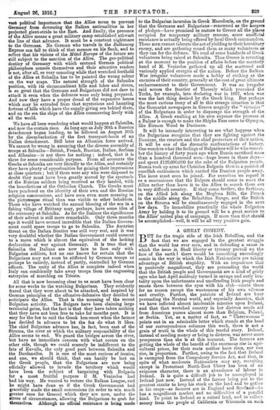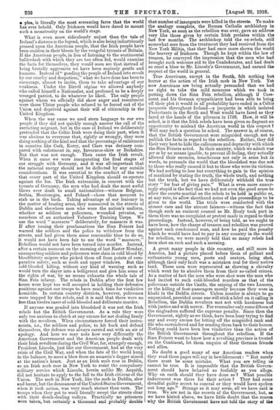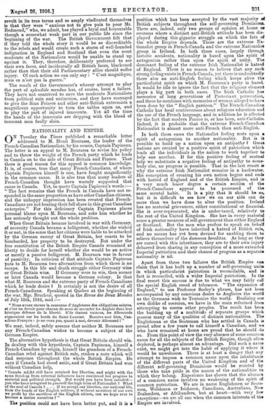A GREAT COMEDY. B UT for the tragio side of the
Irish Rebellion, and the fact that we are engaged in the greatest struggle that the world has ever seen, and in defending a cause in which the issue is, Shall liberty or tyranny prevail on the face of the earth? there would be something exceedingly comio in the way in which the Irish Nationalists are taking advantage of British stupidity. With an impudence that is positively magnificent, they are persuading the world that the British people and Government are a kind of grisly ogre who last April suddenly turned in savage and surly bru- tality upon the unfortunate and unoffending Irish people and smote them between the eyes with his club—smote them for no reason except the wantonness of his own vileness and cruelty. Further, the patriots of Ireland are busy persuading the Neutral world, and especially America, that we have inflicted almost intolerable miseries upon Ireland, and that that wretched country in her distress needs aid from American purses almost more than Belgium, Poland, or Serbia. Yet, as a matter of fact, as " Ulsterwoman " points out in an admirable letter which stands at the head of our correspondence columns this week, there is not a Frain of truth in the whole of this tearful story. Ireland, instead of needing money or being in distress, was never more prosperous than she is at this moment. The farmers are getting the whole of the benefit of the enormous rise in agri- cultural prices, for their rents neither have risen, nor can rise, hi proportion. Further, owing to the fact that Ireland is exempted from the Compulsory Service Act, and that, in spite of what moderate Nationalists may say, recruiting except in Protestant North-East Ulster has been of an exiguous character, there is an abundance of labour in Ireland. It is quite a difficult job to be unemployed in Ireland just now. Instead of the farmer being put to the greatest straits to keep his stock on the land and to gather in his crops—as farmers are in England and Scotland—he has a magnificent market and no difficulties of a parallel kind. To point to Ireland as a ruined land, and to collect money from the people of California or Wisconsin on such a plea, is literally the most screaming farce that the world has ever beheld. Only Irishmen would have dared to mount such a monstrosity on the world's stage.
What is even more ridiculously unjust than the tale of Ireland's distress is the legend, which is also being industriously pressed upon the American people, that the Irish people have been smitten in their bloom by the vengeful tyrants of Britain. If the American people, in lieu of listening to the sentimental balderdash with which they are too often fed, would examine the facts for themselves, they would soon see that instead of being brutally aggressive we have been supinely gentle and humane. Instead of goading the people of Ireland into revolt by our cruelty and despotism," what we have done has been to encourage, almost to incite, them to take advantage of our weakness. Under the Birrell regime we allowed anybody who called himself a Nationalist, and professed to be a deeply wronged patriot, to do whatever he liked. The only people against whom we officially did show anger and resentment were those Ulster people who refused to be forced out of the Union and deprived against their will of citizenship in the United Kingdom.
When the war came we used stern language to our own people if they did not quickly enough answer the call of the recruiting sergeant, but in the case of Ireland we deliberately pretended that the Celtic Irish were doing their part, when it was obvious to everyone that, rightly or wrongly, they were doing nothing of the kind and that the percentage of enlistment in counties like Cork, Kerry, and Clare was derisory com- pared with enlistment in, say, Inverness-shire or Berkshire. But that was not enough. Then came the Irish revolt. When it came we were inaugurating the final stages of our struggle with Germany, and it was all-important that the national energy should not be deflected by any outside considerations. It was essential to the conduct of the war that every part of the United Kingdom should co-operate against the foe. The Irish extremists, in concert with the tyrants of Germany, the men who had dealt the most awful blows ever dealt to small nationalities—witness Belgium, Serbia, Montenegro, and Poland—chose that moment to stab us in the back. Taking advantage of our leniency in the matter of bearing arms, they massacred in the streets of Dublin and elsewhere men who wore the nation's uniform, whether as soldiers or policemen, wounded privates, or members of an authorised Volunteer Training Corps. We use the word " massacre " deliberately, for massacre it was. If after issuing their proclamations the Sinn Feiners had warned the soldiers and the police to withdraw from the streets, and had given them some reasonable time to do so, it would not have been fair to use the word "massacre." Rebellion would not have been turned into murder. Instead, after a certain moment on the morning of last Easter Monday, unsuspecting soldiers and policemen were slain in cold blood by bloodthirsty snipers who picked them off from points of com- parative safety, such as roofs and upper windows. But this cold-blooded killing, without any kind of warning such as would turn the slayer into a belligerent and give him some of the rights of war, by no means exhausts the whole tale of Sinn Fein infamy. The rebels in Dublin after the first few hours were kept too well occupied in holding their defensive positions against our troops to have much time for vindictive homicide. In certain country districts, however, policemen were trapped by the rebels, and it is said that there were no less than twelve cases of cold-blooded and deliberate murder.
If anyone was goaded into bloodshed it was not the Irish rebels but the British Government. As a rule they were only too anxious to clutch at any excuse for not dealing firmly with the revolters. When circumstances forced their instru- ments, i.e., the soldiers and police, to hit back and defend themselves, the defence was always carried out with an air of apology. And here we may note how very differently the American Government and the American people dealt with their Irish revolters during the Civil War, for, strangely enough, President Lincoln, just like our Government, had at the very crisis of the Civil War, and when the fate of the world hung in the balance, to meet a blow from an assassin's dagger aimed at the nation's heart. Just as an Irish mob rose in Dublin, so an Irish mob rose in New York to resist the compulsory military service which Lincoln, herein unlike Mr. Asquith, did not hesitate to apply to the full to the Irish citizens of the Union. The mob in New York, like the mob in Dublin, slew and burnt, but the demeanour of the United States Government, when it took action, was very much sterner than ours. The troops when they got to work literally swept the streets clear with their death-dealing volleys. Practically no prisoners were taken, but certainly a thousand and probably double that number of insurgents were killed in the streets. To make the analogy complete, the Roman Catholic archbishop in New York, as soon as the rebellion was over, gave an address very like those given by certain Irish prelates within the last few months. The archbishop told the ex-rebels, still somewhat sore from the treatment they had received from the New York Militia, that they had once more shown the world the bravery of Irishmen. Though he kept within the law of treason, he conveyed the impression that the men who had brought such welcome aid to the Confederates, and had dealt so cruel a blow to Mr. Lincoln's Government, had earned the respect of the world in general.
True Americans, except in the South, felt nothing but horror at the action of the Irish mob in New York. Yet now Americans are beina° actually persuaded that we had no right to take the mild measures which we took in putting down the Sinn Fein rebellion, although if Case- ment and his German sympathizers had been able to bring off their plot it would in all probability have ended in a Celtic jacquerie throughout Ireland—a j acquerie in which isolated Protestants in the South and West would have fared as they fared at the hands of the pikemen in 1798. How, it will be asked, is it that the Irish rebels have been given so flagrant an opportunity to mislead the American world in this respect Well may such a question be asked. The answer is, of course, that the British Government were misguided enough not to publish the facts in regard to the rebellion. Rather, they did their very best to hide the callousness and depravity with which the Sinn Feiners acted. In their anxiety, which we admit was per se by no means ignoble, to prevent ill-feeling, they actually allowed their enemies, treacherous not only in arms but in words, to persuade the world that the bloodshed was due not to those who really caused it but to those who were its victims. We had nothing to lose but everything to gain in the opinion of mankind by stating the truth, the whole truth, and nothing but the truth, but we have deliberately withhold the true story "for fear of giving pain." What is even more annoy- ingly stupid is the fact that we had not even the good sense to allow the courts-martial on the rebels to be held in public or, at any rate, to allow shorthand notes of the proceedings to bc; given to the world. The trials were conducted with the utmost care and the utmost fairness—witness the fact that though such an eminent counsel as Mr. Healy took part in them there was no complaint or protest made in regard to their proceedings. Instead, however, of being told, as we ought to have been, how the charge of treason and rebellion was proved against each condemned man, and how he paid the penalty which he would have had to pay in any country in the world for rebellion, we were merely told that so many rebels had been shot on such and such a morning.
A great many people in this country, and still more in America, had a picture placed before them of gallant and enthusiastic young men, poets and orators, being shot, although their only fault was a mistaken zeal for their native land. These men were represented as showing a chivalry which went far to absolve them from their so-called crimes. As a matter of fact the men who were shot were the men who had incited to such cold-blooded murders as that of the policeman outside the Castle, the sniping of the two Lancers, or the killing of foot-passengers merely because they were in khaki in the Dublin streets. Unless murder is always to go unpunished, provided some one will stick a label on it calling it Rebellion, the Dublin revolters met not with harshness but with justice and with mercy. For remember only some fifteen of the ringleaders suffered the supreme penalty. Since then the Government, rightly as we think, have been busy trying to find any and every excuse for letting off the misguided rank and file who surrendered and for sending them back to their homes. Nothing could have been less vindictive than the action of the British Government throughout the rebellion. If the Sum Feiners want to know how a revolting province is treated on the Continent, let them enquire of their German friends and allies.
No doubt a good many of our American readers when they read these pages will say in bewilderment : "But surely there must be some mistake. What you are telling us cannot be true. It is impossible that the British Govern- ment should have behaved so foolishly as you allege. Why on earth should they have done so I What possible inducement was there for their action I They had some dreadful guilty secret to conceal or they would have spoken out long ago. Strange as it may seem, all we have said is true. We are not in the secrets of the Government, but, as we have hinted above, we have little doubt that the reason why the British Government have not told the story of the revolt in its true terms and so amply vindicated themselves Is that they were "anxious not to give pain to poor Mr. Redmond," who, we admit, has played a loyal and honourable though a somewhat weak part in our public life since the beginning of the war. The British Government felt that if they told the whole story it would be so discreditable to the rebels and would create such a storm of well-founded indignation in England and Scotland that even the most moderate of the Nationalists would be unable to stand up against it. They, therefore, deliberately preferred to see their own faces, and incidentally all British faces, blackened rather than that their old Parliamentary allies should suffer injury. Of such action we can only say : " C'est magnifique, mais ce n'est pas la guerre."
The result of the Government's wheezy attempt to play the part of splendicle mendas has, of course, been a failure. They have not contrived to save the moderate Nationalists from political ruin and extinction, and they have managed to give the Sinn Feiners and other anti-British extremists a magnificent opportunity to turn the tables upon us, and to play the part of injured innocents. Yet all the time the hands of the innocents are dripping with the blood of innocent men foully slain.




























 Previous page
Previous page